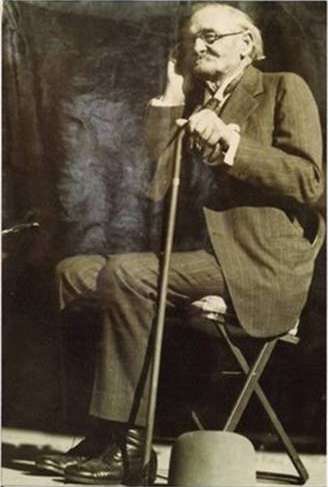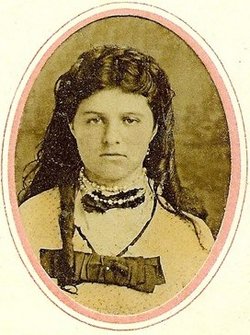Leander Randon "Lallie" Millican (1853-1938)
 Leander Randon Millican, Baptist missionary, was born at Millican, Brazos County, Texas, on August 27, 1853, to
Elliott McNeil and Marcella Boyce Triplett Millican. He was the grandson of Robert Hemphill Millican, one of the Old
Three Hundred. In 1874, while he was deputy sheriff of Lampasas County, Millican was converted in a Methodist camp
meeting. He joined the Baptist Church at Lampasas later that year. He attended Baylor University at Independence during
the 1874-75 term and was licensed to preach on February 20, 1875, whereupon he began to minister in the vicinity. He
married Georgia Katherine Saunders, (1855-1948) of Round Mountain on February 14, 1878. On September 1,
1879, Millican was commissioned as missionary for the San Saba Association; with the exception of three months, he was
missionary for the Texas and Southern Baptists, particularly the El Paso Association, for the rest of his life. His work
was with small, struggling churches on a half-time, quarter-time, or monthly basis in an area from San Angelo west to El
Paso and south to Presidio. He helped organize many churches, including the First Baptist churches in Fort Davis,
Presidio, Valentine, and San Angelo. During his ministering travels on horseback he dreamed of a camp meeting to bring
ranchers, cowboys, and churches together for preaching and classes. His dream was realized on July 28, 1915, when he and
George W. Truett met with ranchers to begin an annual cowboy camp meeting that became known as Paisano Baptist
Encampment. This meeting still occurs every July between Alpine and Marfa in the Davis Mountains.
Leander Randon Millican, Baptist missionary, was born at Millican, Brazos County, Texas, on August 27, 1853, to
Elliott McNeil and Marcella Boyce Triplett Millican. He was the grandson of Robert Hemphill Millican, one of the Old
Three Hundred. In 1874, while he was deputy sheriff of Lampasas County, Millican was converted in a Methodist camp
meeting. He joined the Baptist Church at Lampasas later that year. He attended Baylor University at Independence during
the 1874-75 term and was licensed to preach on February 20, 1875, whereupon he began to minister in the vicinity. He
married Georgia Katherine Saunders, (1855-1948) of Round Mountain on February 14, 1878. On September 1,
1879, Millican was commissioned as missionary for the San Saba Association; with the exception of three months, he was
missionary for the Texas and Southern Baptists, particularly the El Paso Association, for the rest of his life. His work
was with small, struggling churches on a half-time, quarter-time, or monthly basis in an area from San Angelo west to El
Paso and south to Presidio. He helped organize many churches, including the First Baptist churches in Fort Davis,
Presidio, Valentine, and San Angelo. During his ministering travels on horseback he dreamed of a camp meeting to bring
ranchers, cowboys, and churches together for preaching and classes. His dream was realized on July 28, 1915, when he and
George W. Truett met with ranchers to begin an annual cowboy camp meeting that became known as Paisano Baptist
Encampment. This meeting still occurs every July between Alpine and Marfa in the Davis Mountains.

Millican worked twelve to eighteen hours a day promoting Baptist causes. He was trusted by the cowmen of the west and was sent by them many times to Austin to speak for legislation in their behalf. In 1897 he became one of four statewide missionaries for the Home Mission Board of the Southern Baptist Convention, and he was assigned to the Committee on Credentials at the Texas Baptist Convention in San Antonio that same year. The committee refused to seat Samuel A. Hayden, who later retaliated with a lawsuit of seven years' duration against Millican and twenty-nine other Baptist leaders. As a member of the Ministers' Union of El Paso, Millican initiated the action that made Judge Roy Bean, rather than the city of El Paso, host to the famous Maher-Fitzsimmons fight in 1896. Millican regarded himself as just another cowboy in spite of the fact that he was one of the most picturesque figures in Baptist work. He preached at cow camps, in pulpits, and occasionally in saloons. He also built several churches. He continually urged others to come west and speak for the Baptist cause. Called "missionary to the mountains," "circuit rider of the plains," "trail-blazing minister," "sky pilot of the plains," and "Brother Lallie," Millican was a loyal Baptist who thought that a strong denomination could accomplish much for the cause of Christ. He wrote two brief works, Sermon and Very Short Life Sketch (1929) and Brief Summary of My Pastoral and Missionary Work (1931). He died on April 18, 1938, in El Paso, preceded in death by his three children. He was buried south of the tabernacle at Paisano Baptist Encampment.
Katy Stokes, "MILLICAN, LEANDER RANDON," Handbook of Texas Online, accessed March 19, 2015.

